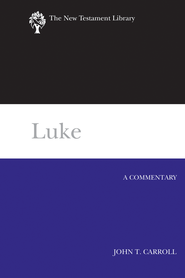For part one of my review, see here. Part two here. (Amazon link to the book.) I wanted to touch on a few issues before finishing up with Carroll.
Empire in Luke (and Acts)
The longest excursus in the commentary (it is one of four given) is “The Reign of God and the Roman Empire in Luke’s Gospel” (398–404). Luke and Acts have received quite a bit of attention in regard to early Christian views of Rome, etc. Carroll adequately summarizes the positions, essentially creating three categories: (1) Pro-Empire (i.e., Luke-Acts basically paints Rome in a positive light); (2) Anti-Empire (i.e., Luke is critical of the empire, the narrative presents Jesus and/or the Christian community as a rival to Rome/Roman domination); and (3) A middle position (following James Scott): “In the circumstances of colonial subjugation, resistance is necessarily indirect, partial, ambivalent, and accompanied by varying levels of cooperation and participation.”
Carroll favors this third (middle) position: <Sorry, I have removed a few lines here because they were causing problems with my website feed.>
Audience Situation
One of the difficulties in Gospels studies is determining what situation the first readers were facing—a situation that may have occasioned the writing or is simply implied by it. It seems to me that some scholars are too confident in their reconstructions of the original audience, and such reconstructions tend to color, even if slightly, their interpretation.
Claims that Luke is providing some sort of legitimation for his audience or community are quite common in Lukan studies—legitimation related to Roman rule, Gentile inclusion, God’s faithfulness to Israel, or a number of other issues. [E.g., Gregory E. Sterling, Historiography and Self-Definition: Josephos, Luke-Acts, and Apologetic Historiograph (NovTSup 64; Leiden: Brill, 1992); Jacob Jervell, Luke and the People of God: A New Look at Luke-Acts (Minneapolis, MN: Augsburg, 1972); R. L. Brawley, Luke-Acts and the Jews: Conflict, Apology, and Conciliation (SBLMS 33; Atlanta: Scholars Press, 1987); Esler, Community and Gospel in Luke-Acts: The Social and Political Motivations of Lucan Theology (SNTSMS 57; Cambridge: Cambridge University Press, 1987).]
I would like to see more care taken by Carroll (and others in general) in presenting the evidence for any such claim and not going further than it allows.
On the whole, Carroll does not often overstep the evidence. In fact, one reason I commend the commentary is because of Carroll’s careful, balanced approach. His literary and theological sensitivity to the text is also commendable. I cannot say Carroll makes a significantly original contribution, but he provides a readable, up-to-date, semi-technical commentary on the Gospel of Luke, accessible to students and pastors.
Update: Thanks to James (below) for reminding me to comment on the unity of Luke-Acts issue I mentioned in an earlier part. I think Carroll (he’s not alone!) assumes too great a unity between the two, Luke and Acts. I see a lot a unity, too, but I’m speaking of a view that supposes the author has pre-planned the whole project, even redacting parts of the Gospel in view of Acts (at some stage), etc. I certainly think that, given the evidence we have, such a position is possible, but I am more comfortable with simple shared authorship (for a recent discussion, see Andrew F. Gregory and C. Kavin Rowe, eds., Rethinking the Unity and Reception of Luke and Acts [Columbia: University of South Carolina Press, 2010]).

I take it that the bit on the unity of Luke-Acts is now going to be in part four. Looking forward to disagreeing with it!
James, thanks for reminding me. I’ve updated the post with a note about the unity issue. Feel free to further the discussion!